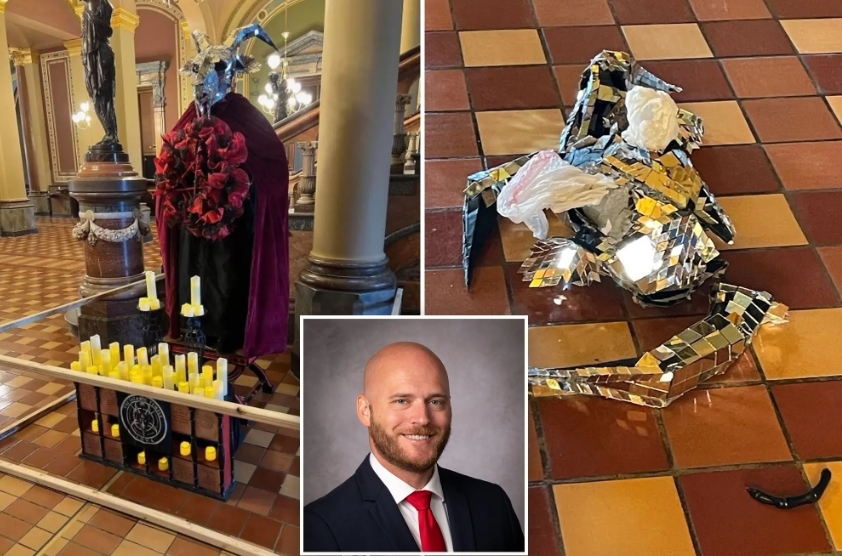On December 22, 2023, Michael Cassidy drove up to the Iowa Capitol and committed a seemingly violent act - he beheaded a statue of Satan. The statue, which had been erected by the Satanic Temple of Iowa, was a source of controversy and uproar among many in the state. The incident quickly gained national attention, with opinions divided on whether Cassidy's actions were justified or a hate crime.
The controversy surrounding the incident only grew when Cassidy, a former military officer and Congressional candidate, was charged with a hate crime by Polk County prosecutors. Initially, he had only been charged with a misdemeanor for fourth-degree criminal mischief, but the possibility of further charges had been mentioned. And now, the decision had been made to formally charge Cassidy with a felony for third-degree criminal mischief under Iowa's hate crime statute.
According to a spokesperson for the Polk County Attorney's Office, Lynn Hicks, Cassidy had made statements to both law enforcement and the public indicating that his actions were motivated by religious beliefs. This was the basis for the hate crime charge - that Cassidy acted with the intention of violating someone's individual rights based on their religion.
The decision to charge Cassidy with a hate crime has sparked debate and controversy. Some argue that his actions were a justified response to what they saw as a blasphemous and offensive display. Others argue that Cassidy's actions were a hate crime and an attack on religious freedom and individual rights. The issue highlights the ongoing tension between the rights of religious groups and those who oppose them.
You need to get used to living under a state that is openly hostile to you. A new president is not going to change the fact that hatred of you shapes the very identity of the managerial class and all of Washington DC. I don’t know how they can be any clearer about it. https://t.co/NrfIjggJ0u
— Martyr Made (@martyrmade) January 31, 2024
Another point of contention is the cost of replacing the statue of Baphomet, estimated to be between $750 and $3,000. The Satanic Temple of Iowa had filed their own damage estimate, claiming that it would cost $3,000 to replace the statue. This further adds to the controversy and raises questions about the value and significance of the statue.
Since the incident, Cassidy has been vocal about his reasons for taking down the statue. He has stated that his conscience is held captive to the word of God, not bureaucratic decree and that he felt compelled to act. His actions have garnered support from some religious groups, with many viewing him as a hero and a defender of their faith.
Cassidy's legal defense has also gained considerable attention and support. He has raised $84,000 for his legal defense on his GiveSendGo page, and Turning Point USA pledged $10,000 to help. Cassidy has also been invited to speak at Turning Point USA events, including the America Fest in Phoenix. During the event, he spoke out against the statue, stating that it was an abomination that needed to be taken down. He warned about the presence of the devil in the world and encouraged people to stay vigilant.
As Cassidy's arraignment on February 15 approaches, the controversy and debate surrounding his actions continue to grow. The incident has sparked discussions about religious freedom, hate crimes, and the appropriate ways to express dissent and protest. And while Cassidy's supporters view him as a hero and a defender of their faith, others condemn his actions as a hate crime and an attack on individual rights.
As the legal process unfolds, the outcome of this case could have far-reaching implications and shape the ongoing debate surrounding religious and individual rights.

